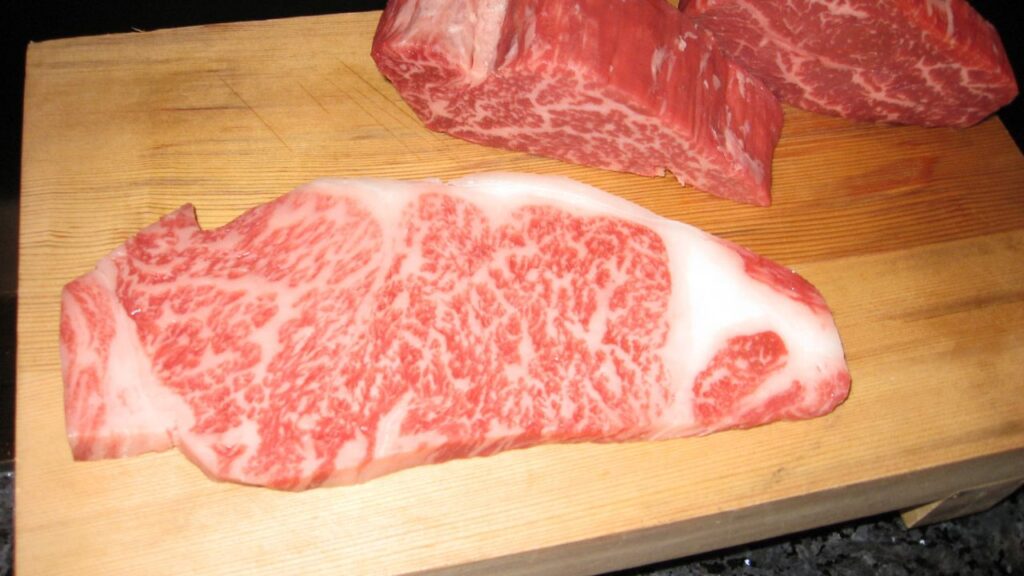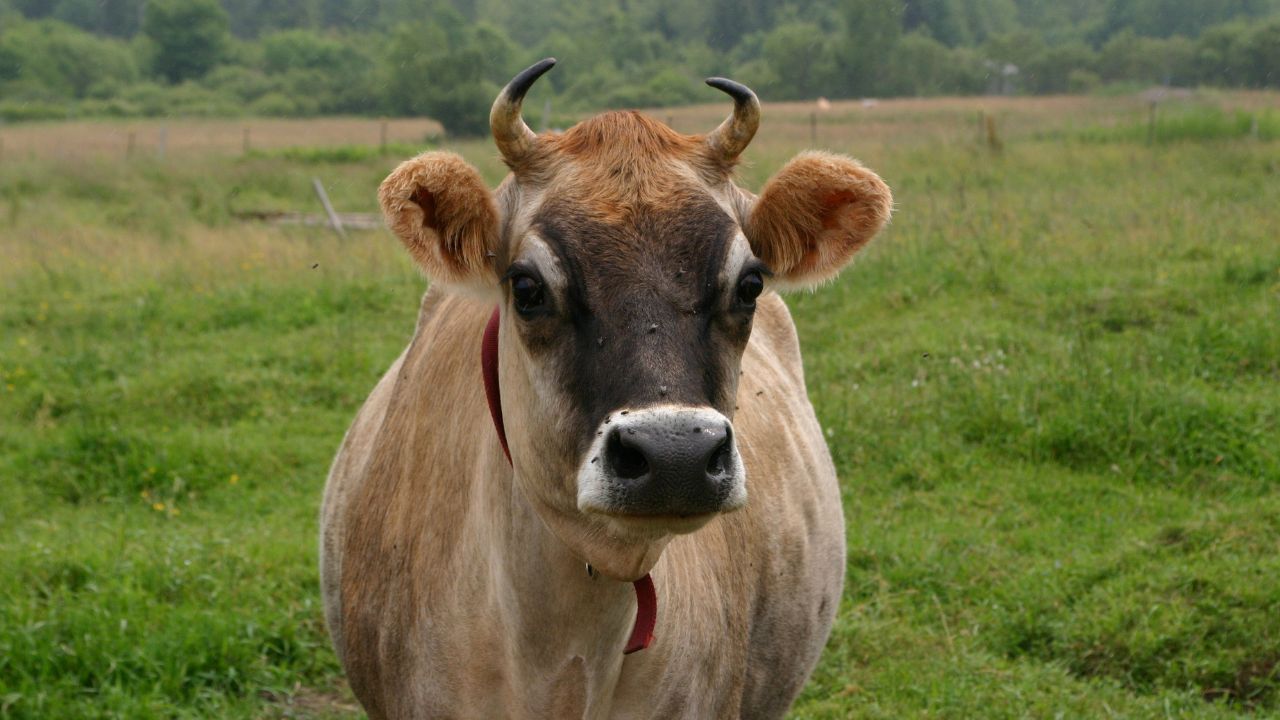Are Jersey Cows Good For Meat? Jersey cows are primarily known for their high milk production rather than their meat quality. While their meat is tender and flavorful, they are not typically raised for beef production.
Jersey cows are some of the world’s most known breeds, renowned for their milk. Praised for producing quality rich milk, Jersey cows have been the kings of dairy farming for centuries.
Jersey cows’ milk is particularly precious for making butter and cheese, with its very high butterfat content.
However, Jersey cows are not just useful for their milk. Farmers and consumers alike, over the years, have sought to find out if Jersey cows are also well-suited for meat production.
The question at hand is: Are Jersey cows good for meat? Let’s look deeper into this topic and find out if Jersey cows are up to the task when it comes to producing beef.
Contents
What Are Jersey Cows?
History and Origin of Jersey Cows
Jersey cows have a fascinating history. They came from the island of Jersey, which is one of the Channel Islands between England and France.
This breed is over a thousand years old. Jersey cows were first known for their excellent milk, and subsequently they became one of the world’s most sought-after dairy breeds. In fact, they are one of the oldest and most historically rooted breeds in the dairy sector.
Their milk quality soon reached all of Europe, and then they entered the United States and other nations. [Are Jersey Cows Good For Meat?]
While Jersey cows were used for milk purposes only in the beginning, they’ve now come to be recognized as a viable option for beef too, particularly for small-scale and specialty farmers.
Key Characteristics of Jersey Cows
Jersey cows are recognizable by their cream or light brown coat. They are smaller than most other breeds of dairy cows, weighing most often between 900 and 1,200 pounds.
Their smaller size makes them convenient for use on smaller farms but is also part of one of the primary challenges to raising them for beef – that they have a relatively low yield for meat.
Their distinctive appearance includes dark markings under their eyes and ears, and these provide a certain grace to their appearance. [Are Jersey Cows Good For Meat?]
Other than providing fine milk, the Jersey cow is also known to be gentle-natured, and they are thus easier to handle compared to some of the larger-sized, fierce beef breeds.
The milk of Jersey cows contains a very high percentage of butterfat, normally 5%. This renders them particularly well-suited to cheese-making, butter, and other dairy-based foods that require a rich, creamy quality.
While their dairy qualities are exemplary, many of them are now beginning to explore their possibilities as a source of beef. [Are Jersey Cows Good For Meat?]
Jersey Cows for Meat: A Brief Overview
Meat Quality of Jersey Cows
Though Jersey cows are kept primarily for milk, their meat has become increasingly popular over the last few years. Jersey cow beef tends to be leaner compared to other more prevalent beef breeds like Angus or Hereford.
However, it still tastes tender and rich in flavor with a smooth texture. Jersey cow meat is described as having a sweet and mild flavor, which differentiates it from other beef.
Jersey beef will tend to be more finely marbled than highly marbled beef, but the marbling is less obtrusive. This is one reason why it is so tender and partly the reason why it is so popular with chefs and foodies.
The flavor is much more refined also, a different experience than the beef from other breeds. It thus has a cult following in the culinary world, particularly those who appreciate lean and fine cuts of meat.
Jersey Beef Compared to Other Breeds
When comparing Jersey beef to other types of beef breeds, there are several differences, primarily because the Jersey cow is smaller.
The other beef breeds, like Angus and Hereford, are quite large, generating a much larger amount of meat. This allows those breeds to be more dominant in beef production because their size results in a more efficient process of generating meat.
But quality-wise, Jersey beef has a taste that some pay for its delicacy and the absence of strongness. [Are Jersey Cows Good For Meat?]
Jersey cows being small in size ensures that they weigh less and less meat is therefore produced by them, hence pushing the cost per pound of Jersey beef to a higher value than other cattle’s beef.
Though it is feasible to breed Jersey cows for both beef and dairy, the breed is more famous for its dairy, and beef production is a secondary option. [Are Jersey Cows Good For Meat?]
Despite this, the food industry has begun to take more interest in Jersey beef as a premium product, appreciating the tenderness and neutral flavor that it offers.
Jersey beef is less easily available than other beef, so it is more valuable on the market. This also means that it has the potential to be very costly.
See Also: Do People Eat Highland Cows? A Gourmet’s Guide
Strengths of Jersey Beef
Tenderness and Flavor
One of the main ways in which Jersey beef stands out is in terms of tenderness. Because the animal is smaller and the muscle fibers are finer, Jersey beef is much more tender than beef from larger cattle.
The tenderness of Jersey beef is why it is a top choice among so many consumers, especially those looking for quality melt-in-your-mouth beef. [Are Jersey Cows Good For Meat?]
Jersey beef is often prized in fine dining restaurants and gourmet butcher shops because of its tender and juicy cuts, like steaks and roasts.
Apart from that, Jersey beef also features a slightly sweet, mild flavor. This compares to the bolder, at times even “gamey” flavors that feature in other cattle breeds.
For those who are looking for something less intense and less overpowering, Jersey beef may be a wonderful option.
Nutritional Benefits
Another advantage of Jersey beef is its nutritional value. Because Jersey cows are leaner than many of the bigger beef breeds, their meat contains less fat, making it more suitable for people who are reducing their fat intake.
The leanness does not compromise the flavor, however, as the meat remains juicy and tender. [Are Jersey Cows Good For Meat?]
Jersey beef also contains important nutrients like iron, zinc, and protein, all of which one needs to maintain a healthy body.
The added lean content also translates to fewer calories than beef from more marbled breeds, so it is a great option for those tracking their caloric intake but would love to indulge in an upscale beef product.
Difficulties in Raising Jersey Cows as Meat
Smaller Size
As mentioned previously, one of the biggest issues of raising Jersey cows for beef is their size. Because Jersey cows are substantially smaller than most other beef cattle, per-cow yield is lower.
Cattle farmers raising Jersey cows for beef must confront this issue, and it is less economical to raise Jersey cows for beef than to raise larger animals.
For commercial beef production, where amount counts, larger breeds are typically utilized since they provide more meat in a shorter period of time. [Are Jersey Cows Good For Meat?]
Jersey cows, while providing quality beef, are not as productive per head with respect to meat to be considered an economic choice for large-scale beef production.
Thus, they are not raised as much for beef purposes as less frequently raised only for beef, even if still valuable for small farms or farm diversification.
Cost-Effectiveness
Breeding Jersey cows for beef is also more expensive than breeding bigger breeds because it involves additional expenditure on maintaining a herd for milk and meat production.
Jersey cows demand proper care and attention, and in order to breed them for beef, additional investment in time, fodder, and resources is required.
The overall cost of money it takes to produce Jersey cows for beef may be greater than the benefits, especially when compared to other breeds that are more meat-efficient.
Farmers who raise Jersey cows for dairy and beef production may find it profitable, especially if they can sell the beef at a premium. [Are Jersey Cows Good For Meat?]
However, for farmers who are focusing on beef alone, return on investment will barely be proportional to raising Jersey cows due to their relative small size and less meat yield.

Other Uses of Jersey Cows
Dairy Production
Jersey cows are well known for their high-quality milk yield. They are highly efficient dairy animals with milk of high butterfat and protein composition.
Jersey milk is thus ideal for making excellent cheese, butter, and other dairy products. Jersey milk is greatly desired by most dairy producers and farmers, and their reputation in the dairy industry is simply unrivaled.
Jersey cattle are perfect for small-scale dairy farms where the quality of the milk is the priority. Due to their size, they also cost less when it comes to feed and space requirements compared to larger dairy cows.
Hence, they are a viable choice for those farmers who desire high-quality dairy without the high input costs associated with big cows. [Are Jersey Cows Good For Meat?]
Dual-Purpose Farms
In other cases, the Jersey cow is utilized for dairy and meat purposes, thereby qualifying as a dual-purpose breed. The technique allows farmers to gain from the milk production by the Jersey cow while still harvesting meat from older or unproductive cows.
Jersey cows may not produce much beef in terms of quantity when compared to bigger breeds, but their beef still has value in specialized markets where quantity is less valued than quality.
Farmers who choose to retain Jersey cows both for meat and milk may discover that they are able to use the most from every animal so that nothing is wasted from the cow.
Double-purpose farming can also prove to be a good option for small farmers who want to diversify their sources of income. [Are Jersey Cows Good For Meat?]
Conclusion: Are Jersey Cows Good For Meat?
While Jersey cows are best known for their premium dairy output, they can, in fact, produce high-quality beef. However, because they are smaller animals and produce less meat, they are not as well-suited to large-scale beef production as other breeds that are typically used for that.
Jersey beef is known for tenderness, good taste, and leanness, which makes it a gourmet product that is pursued by chefs and upscale shoppers. [Are Jersey Cows Good For Meat?]
Although these advantages are present, it might be less cost-effective to breed Jersey cows for beef due to their size and the higher expense of raising them for dairy and beef.
Jersey cows could be better suited for small farms or dual-purpose farms where milk and beef can both be utilized to their full potential.
FAQs
Can Jersey cows be raised for beef alone?
Though it is practiced, Jersey cows are not commonly raised solely for beef since they are smaller and produce less meat. [Are Jersey Cows Good For Meat?]
How is Jersey beef valued in relation to other beef?
Jersey beef is more expensive due to the fact that it is sold in lesser amounts, it produces less meat, and it is of better quality.
Are Jersey cows more suitable for dairy or beef production?
Jersey cows are most suitable for dairy production, though they can be raised for beef on small or dual-purpose farms. [Are Jersey Cows Good For Meat?]
Which breeds are more suitable for beef production than Jersey cows?
Beef breeds such as Angus, Hereford, and Charolais are more suitable for beef production since they are larger and have higher meat yield.

Connor Dominguez is an author for NewZeland with extensive experience in cattle farming. He is a passionate blogger, sharing his insights and expertise on farming, rural life, and agricultural practices.

